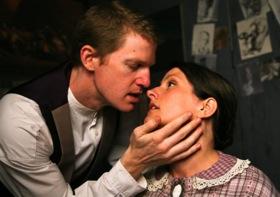
Photo by Eric Chazankin
It’s a story of unknowing maternal incest in mid-19th-century Maine, but composer Tobias Picker thinks it will be right at home in Petaluma’s Cinnabar Performing Arts Theater, and he’ll be there next week during dress rehearsals to help parent the West Coast premiere of his creation.
His Emmeline, said Picker, “is an opera that everybody can identify with, in some way.” The Sacramento-based soprano Carrie Hennessey, who sings the title role of the doomed millworker, found herself drawn into the story after she’d been offered the part and had audited the 1998 recording on Albany Records “to find if there was anything that would hinder my saying ‘yes.’ Well, I listened all the way through, and I was weeping.”
Listen to the Music
The pathos continued after Hennessey started rehearsing with the Cinnabar ensemble, under the musical direction of Nina Shuman. “At the end of Act 2, when everything falls apart, there’s this haunting girls chorus, and the first time we went through this, we were all in tears,” she remarked. After a few weeks of rehearsal, “My body said, you can continue weeping, but you have to do this — breathe, engage, and go — to get through this part. I wept through almost half the scene, but was still able to sing the high C’s at the end, and crumble.”
“The part of Emmeline is extremely demanding,” Picker confirmed, “and it requires a very strong singer who has great stamina.” For one thing, the character is on stage in practically every scene. For another, she has to travel a harrowing emotional journey and transmutation from a teenage laborer in a Massachusetts mill on to seduction by her supervisor, childbirth, the forced surrender of her child, isolation in her family homestead in Maine, a new romance and marriage with a younger man, and the discovery that this man is the son she never knew — all under the accusative scrutiny of the other characters.
Hennessey finds Picker’s compositional style propulsive and supportive. “It’s really intimate in some ways and extremely epic in others. You can hear little signs in the accompaniment and the musical lines, the natural way you would approach a person to whom you’re speaking. You get the feel for the nuance in the score, and you hear exactly what the characters are thinking in their heads, even though they might not be saying it. The physical movement and the emotional connection go hand-in-hand.”
But the going can also be “extremely tricky, because he’s all the time changing meter, and yet the orchestration is very sparse and doesn’t give you much clue at all, because it’s often very conversational. The recitative-type moments are extremely specific, so it’s not ‘roll a chord and say your lines,’ it’s a 7/8 bar, a 6/4, a 2/4, a 3/4, a 5/8, with maybe whole notes underneath you, so you’d better count and know where you are!”

This is 36-year-old Hennessey’s first experience with American opera, and she’s enjoying the cultural touches. “There’s a big chunk of music played by harmonica; [the hymn] Rock of Ages is heard; and the harmonies heard when the girls are singing in the mill are very Americana, though it’s five-part. And I like working with a composer who’s alive and breathing, so that we don’t have to rely on tradition; we can actually call him on his cell.” She’s also pleased that the story’s adolescent millworkers, singing with her in Act 1 will be (for the first time in this production), some of who have come up through Cinnabar’s Young Repertory Company.
Picker had already composed a couple of symphonies and a widely performed and recorded tone poem, Old and Lost Rivers, before he found the inspiration for his first opera in a 1989 public television program titled Sins of Our Mothers and in the novelized version of the story of Emmeline Gurney written by his friend Judith Rossner. “It resonated for me on every level,” Picker recalled. “It’s Oedipus, told through Jocasta’s eyes — a slightly different twist on a myth that’s eternal. The universality gripped me.”
Emmeline was premiered by the Santa Fe Opera in 1996, with Patricia Racette in the title role. Bernard Holland of The New York Times wrote of the New York City Opera debut two years later, “After wading through so many bad new American operas over the last 17 years, it is a pleasure to come across one that works this well.”
Fresh from the West Coast premiere of his fourth opera, An American Tragedy (based on the Dreiser novel), at Santa Monica College earlier this month, Picker said he would be “excited to see what Elly [Lichenstein, Cinnabar’s executive director and stage director] has done with the production [of Emmeline]. I’ve heard such good things about her and Cinnabar for years; it’s a very famous place, actually. ... And less is more, when it comes to opera-house size.”

